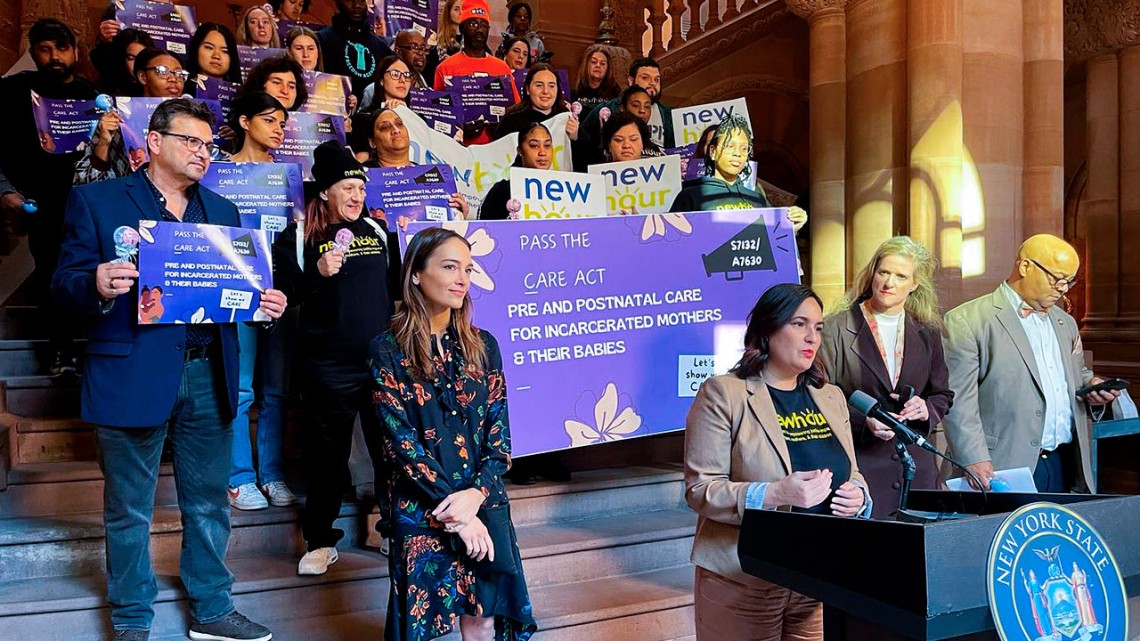
Serena Martin-Liguori, executive director of Long Island-based nonprofit New Hour for Women and Children, speaks to media with supporters of the bill, including Assemblyperson Anna Kelles (D-125th District) and State Senator Julia Salazar (D-18th District), and Cornell students from the Brooks School's State Policy Advocacy Clinic.
Students, formerly incarcerated women draft bill for NYS Assembly
By Giles Morris
Students from the Brooks School’s State Policy Advocacy Clinic have teamed up with lawmakers and a community-based nonprofit representing formerly incarcerated mothers to introduce new legislation that would protect the rights of pre- and postnatal women in prisons and jails across New York.
On Feb. 6, the students – Bridgit Haggerty ‘24, Patrick Kuehl ‘24, masters student Owen (“Gus”) Dunn-Hindle, Vienna O’Brien ‘24, Njeri Kiritu ‘24, Serena Wang ‘25, Melanie Harster ‘24 and Kristen D’Souza ‘24 – traveled to Albany to hear the legislation they drafted as part of the CARE Act introduced on the New York State Assembly floor by its sponsor, Assemblyperson Anna Kelles (D-125th District).
“For the last year we’ve had undergraduate and graduate students from the policy law clinic who are standing here, who wrote this piece of legislation that I have the honor of carrying that requires pre- and postnatal care in the carceral system,” Kelles told the crowd in the Assembly chambers, before addressing the students directly. “You did the research, you did the strategy, the messaging… I was so blown away. This is what civic engagement looks like. This is what we should have at every level of government.”
The partnership is an outgrowth of the State Policy Advocacy Clinic’s experiential learning, in which students work with community groups to improve policy. Members of the team worked closely with the Long Island-based nonprofit New Hour for Women and Children, which was founded in 2015 to support justice-impacted women, children and families through both direct service and advocacy efforts.
The CARE Act (S7132/A7630), which amends Section 611 of the state correction law relating to births to incarcerated individuals and care of children to incarcerated individuals, represents months of collaboration between the team and the legislation’s advocates, which included New Hour, Kelles, and State Senator Julia Salazar (D-18th District).
Haggerty, a human development major in the College of Human Ecology, was able to use the skills she gained in her major classes to conduct a review of developmental research on the best practices for fostering maternal-infant bonding between mothers who are incarcerated and their newborns.
“New Hour included a right to maternal-infant skin-to-skin contact directly following birth in the most recent version of the CARE Act,” Haggerty said. “It was rewarding to see these findings become part of the language of a bill that directly supports the health and well-being of women and infants across New York."
While the bill’s fate will be decided in the coming months, the push to expand the rights of incarcerated women and their children is an ongoing process for New Hour and its members, many of whom are formerly incarcerated mothers. Founder Serena Martin-Liguori explained that the chance to advocate for policies informed by the experiences of New Hour’s community members and drafted by the students was an important step forward.
“This work would not be possible without support from our community and the students from Cornell,” Martin-Liguori said. “We believe in dignity and justice for all people, but especially for women behind bars in our prisons and jails, who are experiencing dire challenges to their reproductive equity.”
The team’s visit to Albany was part of a broader effort to bring the legislation to the attention of New York lawmakers. As sponsor, Kelles is working for the new policies to be adopted, which will require votes in both the State Assembly and the State Senate.
“I am grateful for the opportunity for our clinical students to work directly with lawmakers and with communities with lived experience,” said Alexandra Dufresne, director of the State Policy Advocacy Clinic. “Many of the students in the clinic will go onto careers in government and in advocacy, so it is crucial for them to gain firsthand experience turning academic research into concrete evidence-based legislative and policy proposals.”
Giles Morris is assistant dean of communications for the Cornell Jeb E. Brooks School of Public Policy.
Media Contact
Get Cornell news delivered right to your inbox.
Subscribe

